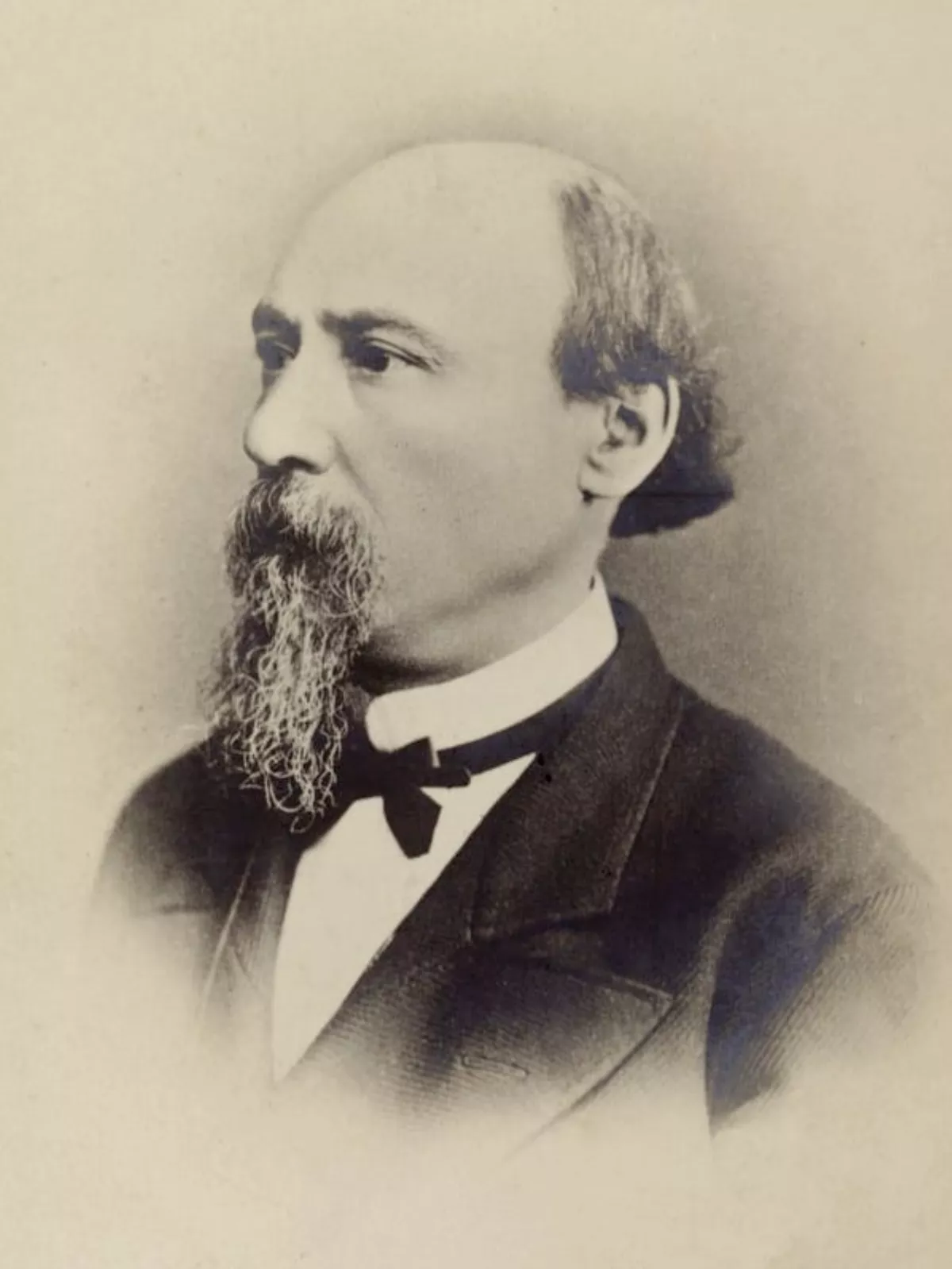 1.
1. Nikolay Nekrasov is credited with introducing into Russian poetry ternary meters and the technique of dramatic monologue.

 1.
1. Nikolay Nekrasov is credited with introducing into Russian poetry ternary meters and the technique of dramatic monologue.
Nikolay Alexeyevich Nekrasov was born in Nemyriv, in the Bratslavsky Uyezd of Podolia Governorate.
Nikolay Nekrasov's father Alexey Sergeyevich Nekrasov was a descendant from Russian landed gentry, and an officer in the Imperial Russian Army.
Nikolay Nekrasov's mother loved literature and imparted this passion to her son; it was her love and support that helped the young poet to survive the traumatic experiences of his childhood which were aggravated by images of social injustice, similar to Fyodor Dostoyevsky's childhood recollections.
In September 1832 Nikolay Nekrasov joined the Yaroslavl Gymnasium but quit it prematurely.
In October 1838 Nikolay Nekrasov debuted as a published poet: his "Thought" appeared in Syn Otechestva.
Several months later Nikolay Nekrasov retrieved and destroyed the unsold bulk of his first collection; some copies that survived have become a rarity since.
In October 1841 Nikolay Nekrasov started contributing to Andrey Krayevsky's Otechestvennye Zapiski, writing anonymously.
In 1842 Nikolay Nekrasov returned to Greshnevo and made peace with his father who was now quite proud of his son's achievements.
In 1843 Nikolay Nekrasov met Vissarion Belinsky and entered his circle of friends which included Ivan Turgenev, Ivan Panayev and Pavel Annenkov.
Several Nikolay Nekrasov's poems found their way into the First of April compilation of humour he published in April 1846.
In November 1846 Panayev and Nikolay Nekrasov acquired a popular magazine Sovremennik which had been founded by Alexander Pushkin but lost momentum under Pyotr Pletnyov.
One of the young authors discovered by Nikolay Nekrasov was Leo Tolstoy who debuted in Sovremennik with his trilogy Childhood, Boyhood and Youth.
Nikolay Nekrasov managed to save the magazine during the 'Seven years of darkness' period when it was balancing on the verge of closure and he himself was under the secret police' surveillance.
Gambling was put to the service too, and as a member of the English Club Nikolay Nekrasov made a lot of useful acquaintances.
In 1854 Nikolay Nekrasov invited Nikolai Chernyshevsky to join Sovremennik, in 1858 Nikolai Dobrolyubov became one of its major contributors.
The first two issues were compiled by Dobrolyubov, from the third onwards Nikolay Nekrasov became this publication's editor and regular contributor.
In 1855 Nekrasov started working upon his first poetry collection and on 15 October 1856, The Poems by N Nekrasov came out to great public and critical acclaim.
In 1861 Nikolay Nekrasov started campaigning for the release of his arrested colleague, Mikhail Mikhaylov, but failed: the latter was deported to Siberia.
In 1873 a group of narodniks in Geneva printed the misleadingly titled, unauthorized Collection of New Poems and Songs by Nikolay Nekrasov, featuring all the protest poems banned in Russia, a clear sign of what an inspiration now the poet has become for the revolutionary underground.
For many years Nikolai Nikolay Nekrasov suffered from a chronic throat condition.
Still unsure as to the nature of the illness, doctor Sergey Botkin advised Nikolay Nekrasov to go to the Crimea.
Already in 1875 the high-profile concilium led by Nikolay Nekrasov Sklifosovsky had diagnosed the intestinal cancer.
One of the last people Nikolay Nekrasov met was Ivan Turgenev who came to make peace after years of bitter feud.
Nikolai Nikolay Nekrasov met the already married Avdotya Panayeva in 1842 when she was already a promising writer and a popular hostess of a literary salon.
The way Nikolay Nekrasov moved into Panayev's house to complete a much-ridiculed love triangle seen by many as a take on the French-imported idea of the 'unfettered love' which young Russian radicals associated with the Socialist moral values.
Nikolay Nekrasov was prone to fits of depression, anger, hypochondria and could spend days "sprawling on a couch in his cabinet, greatly irritated, telling people how he hated everybody but mostly himself," according to Zhdanov.
In 1863, while still with Panayeva, Nikolay Nekrasov met the French actress Celine Lefresne, who was at the time performing at the Mikhaylovsky Theatre with her troupe.
Nikolay Nekrasov became his lover; Nekrasov, when in France, stayed in her Paris flat several times; she made a visit to Karabikha in 1867.
Nikolay Nekrasov helped Celine financially and bequeathed her a considerable sum of money.
In 1870 Nekrasov met and fell in love with 19-year-old Fyokla Anisimovna Viktorova, a country girl for whom he invented another name, Zinaida Nikolayevna.
On 7 April 1877, in a symbolic gesture of gratitude and respect, Nekrasov wed Zinaida Nikolayevna at his home.
Nikolay Nekrasov lambasted this move in his satirical cycle Songs of the Free Word, the publication of which caused more trouble for Sovremennik.
In 1867 Nikolay Nekrasov started his Poems for Russian Children cycle, concluded in 1873.
In poems like "The Morning" and "The Frightful Year" Nikolay Nekrasov sounds like a precursor to Alexander Blok, according to biographer Yuri Lebedev.
Nikolai Nikolay Nekrasov is considered one of the greatest Russian poets of the 19th century, alongside Alexander Pushkin and Mikhail Lermontov.
Nikolay Nekrasov was credited with being the first editor of Fyodor Dostoevsky, whose debut novel Poor Folk made its way into the St Petersburg Collection which, along with its predecessor, 1845's The Physiology of Saint Petersburg, played a crucial role in promoting realism in Russian literature.
Unlike many of his radical allies, though, Nikolay Nekrasov held the Orthodox Christianity and 'traditional Russian national values' in high esteem.
Nikolay Nekrasov's poetry was admired and profusely quoted by liberals, monarchists, and nationalists, as well as Socialists.